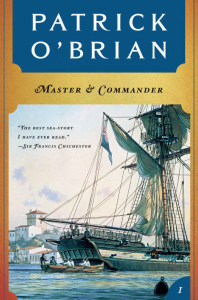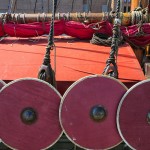 J.R.R. Tolkien was the first great literary discovery of my life, and the author of the book that I’ve returned to more often than any other. I fell in love with his work when I was nine, and have never fallen out of it.
J.R.R. Tolkien was the first great literary discovery of my life, and the author of the book that I’ve returned to more often than any other. I fell in love with his work when I was nine, and have never fallen out of it.
Patrick O’Brian is the second great literary discovery of my life; I first made his (literary) acquaintance sometime in the mid-90’s, and have loved his work ever since.
Some of you are now nodding your heads, some of you are shaking them, and some of you are wondering what the ruckus is all about. Those of you in the first group, you’re on your own; I’m not going to preach to the choir. No, this review is for those of you in the second and third groups. I have hopes that some of you in the second group, who have tried O’Brian and found him lacking, will with persistence move into the first group; and that some of you in the third group who might otherwise have gotten stuck will be able to move to the first group as well.
Here’s the background: Master and Commander is the first book in the very long Aubrey/Maturin series of historical novels, which in turn were the basis for the Russell Crowe movie of the same name. Jack Aubrey, as we first meet him, is a lieutenant in His Majesty’s Navy, about to be appointed to his first command during the wars with Napoleon; Stephen Maturin is a physician and naturalist he meets and befriends in Minorca. The series follows them from the days of their youth through the course of their careers, and builds up a large cast of secondary characters.
The series is often compared with C.S. Forester’s tales of Horatio Hornblower, and this I think is a mistake. Both are set at sea, both take place during the Napoleonic wars, both involve the career of an officer in the Royal Navy—but while Hornblower is pure nautical adventure, O’Brian’s series is anything but. Mind you, there is nautical adventure aplenty, and I enjoy that thoroughly. But Aubrey and Maturin have a depth that Hornblower lacks. The Hornblower tales are romances in the classic sense: tales in which the action is primarily external. Master and Commander isn’t a romance (though it has romantic aspects) but a novel, a book in which the important action is internal rather than external. It’s possible to read the Aubrey/Maturin series purely as adventure novel (I did my first time through) but it can be an awfully puzzling endeavor: books sometimes stop where the logic of the novel dictates, leaving the adventure hanging. In those days, when I couldn’t just download the next e-book, I found it useful to buy the novels in threes, so that I could keep reading.
In the case of Master and Commander, though, I think the problem is more a bit of inexperience on O’Brian’s part. Time and again I hear people say, “Oh, I tried that book, but I kept getting lost in all of the nautical terminology, and so I gave up.” And usually I can pinpoint the spot at which they did it.
Jack Aubrey has just taken command of His Majesty’s Sloop Sophie, and Stephen Maturin has just come aboard. Jack’s rather busy, and suggests that Mowett, one of the senior midshipmen, might give Stephen a tour of the sloop. Mowett’s trying to pass the lieutenant’s exam, and is just full of all of sorts of helpful details; and O’Brian gives us all of it, from the height of the masts to the names of various odd bits of hardware; the futtock shrouds, for example. It’s all rather confusing, to both Stephen and the reader, and goes on rather too long.
It’s possible to pay attention to every word Mowett says, and work out just what he’s talking about, if you work at it—I’ve done that—but I find that it’s best to let Mowett’s words flow over you for their nautical flavor, and not pay too much attention to them. After all, Stephen isn’t paying any more attention to Mowett than he can manage; he’s just discovered that the sloop’s lieutenant is one James Dillon, a man he’d known well in earlier life, in circumstances that are now dangerous—truly dangerous—to remember, and wondering what he’s going to do about it. So he goes along into the tops with Mowett, pausing only to be scared to death, and responds with anything that will keep Mowett talking as his mind and heart race.
O’Brian took the lesson from this book; in later interviews, he often said, “You must include the crosscatharpins; but you must not explain the crosscatharpins.” In this passage he tried a little too hard to explain, and he loses many readers. For those of you who had this problem, I assure you: if you keep on, it gets better.
And now I want to give a few examples of why I love this book so much: it’s O’Brian’s prose, his amazing ability to pack a picture into ten words instead of a thousand.
First, here’s an example where O’Brian overdoes it with the terminology; but it’s worth it for the image at the tale end, of Aubrey surfacing like a majestic whale and frightening the topsman:
Jack stepped over to the weather-rail, swung himself into the shrouds and ran up the ratlines. ‘This may not look quite dignified, in a captain,’ he reflected, pausing under the loom of the top to see just how much more clearance well-bowsed cross-catharpings might give the yard. ‘Perhaps I had better go up through the lubber’s hole .’ Ever since the invention of those platforms some way up the mast called tops, sailors have made it a point of honour to get into them by an odd, devious route – by clinging to the futtock-shrouds, which run from the catharpings near the top of the mast to the futtock-plates at the outer edge of the top: they cling to them and creep like flies, hanging backward about twenty-five degrees from the vertical, until they reach the rim of the top and so climb upon it, quite ignoring the convenient square hole next to the mast itself, to which the shrouds lead directly as their natural culmination – a straight, safe path with easy steps from the deck to the top. This hole, this lubber’s hole, is as who should say never used, except by those who have never been to sea or persons of great dignity, and when Jack came up through it he gave Jan Jackruski, ordinary seaman, so disagreeable a fright that he uttered a thin scream.
Stephen makes his first cruise with Jack as Jack’s guest; and as the second begins he and Jack are dining in the gunroom, which is to say in the officer’s mess. (The captain usually eats in his cabin, with any guests he might choose to invite.)
‘Well, gentlemen,’ [Jack] said, after they had drunk the King’s health, ‘I have news that will please you, I believe; though I must ask Mr Dillon’s indulgence for speaking of a service matter at this table. The admiral gives us a cruise on our own down to Cape Nao. And I have prevailed upon Dr Maturin to stay aboard, to sew us up when the violence of the King’s enemies happens to tear us apart.’
‘Huzzay – well done – hear, hear – topping news – good – hear him,’ they cried, all more or less together, and they looked so pleased – there was so much candid friendliness on their faces that Stephen was intensely moved.
‘Lord Keith was delighted when I told him,’ Jack went on. ‘Said he envied us extremely – had no physician in the flag-ship – was amazed when I told him of the gunner’s brains – called for his spy-glass to look at Mr Day taking the sun on deck – and wrote out the Doctor’s order in his own hand, which is something I have never heard of in the service before.’
Nor had anyone there present – the order had to be wetted – three bottles of port, there Killick – bumpers all round – and while Stephen sat looking modestly down at the table, they all stood up, crouching their heads under the beams, and sang.
I love that last line: “they all stood up, crouching their heads under the beams, and sang.” I can just see them, all crowded around the narrow table, in the cramped space of the gunroom, bending over like passengers in the window seat of an airplane who are waiting for those ahead of them to deplane but insist on standing up anyway.
Anyway—O’Brian is really good stuff, and comes with my highest recommendation, and it’s really truly worth your time to make the effort, and not let a little Mowett put you off.
Mind you, then you need to plow through Post-Captain, which is a whole ‘nuther kettle of fish. But more of that anon.















